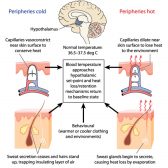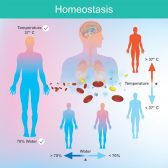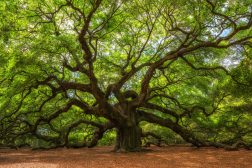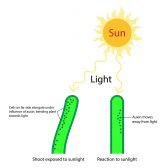Definition
noun
A cyclical series of biochemical reactions that occur in the stroma of chloroplasts during photosynthesis. It includes the light-independent reactions such as carbon fixation, reduction reactions and ribulose 1,5-diphosphate (RuDP) whereby sugars and starch are ultimately produced.
Supplement
At this stage of photosynthesis, the energy released from ATP produced during light reactions is used to drive the conversion of carbon dioxide and other compounds into an organic molecule (e.g. glucose).
In C3 plants, the Calvin-Benson cycle is used directly to fix carbon dioxide. In C4 plants and CAM plants, a different carbon fixation precedes Calvin-Benson cycle.
Word origin: named after its discoverers, Melvin Calvin, James Bassham (and Andrew Benson) at the University of California, Berkeley.
Variants: Calvin cycle or Calvin- Benson-Bassham cycle
See also: Photosynthesis on Tutorials for further information.
Dictionary > Calvin-Benson cycle
You will also like...

Temperature Regulation in Animals
This tutorial elucidates body temperature regulation. Know the details here to learn how the body sets the body temperat..

The Water Cycle
The water cycle (also referred to as the hydrological cycle) is a system of continuous transfer of water from the air, s..

Physiological Homeostasis
Homeostasis is essential to maintain conditions within the tolerable limits. Otherwise, the body will fail to function p..

Seed Plants
Seed plants are vascular plants. They differ from the other vascular plants in producing seeds that germinate into a new..

Plant Auxins – Phototropism & Geotropism
Plants produce hormones to regulate their growth. Auxins, for instance, influence plant growth. Know the role of auxin i..

Respiration
The human respiratory system is an efficient system of inspiring and expiring respiratory gases. This tutorial provides ..

